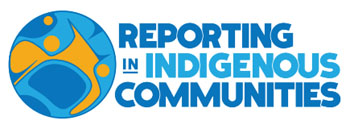USEFUL LINKS: RESOURCES FOR JOURNALISTS
This is a brief selection of background information for non-Indigenous and Indigenous reporters (borrowed from another useful resource: the Dibaajimo Indigenous reporters portal).
HISTORICAL OVERVIEW
https://www2.metisnation.ca/about/
A brief history documenting significant dates in the development of the Métis nation.
https://www.canada.ca/en/crown-indigenous-relations-northern-affairs.html
Official website of Crown-Indigenous Relations and Northern Affairs Canada (CIRNAC). Presents a cultural overview, spanning historical treaties to present day rights.
https://www.canada.ca/en/indigenous-services-canada.html
Official website of Indigenous Services Canada (ISC).
Categorized into several sections, including: “Indigenous health”, “Education”, “Water in First Nations Communities”, “Social Programs”, “First Nations Housing”, and “Governance”.
This report on the ‘Royal Commission on Aboriginal Peoples’ was completed in 1996. It is an investigation into the living condition of Indigenous Peoples in Canada, and included 444 recommendations for the future.
TERMINOLOGY
https://www.oise.utoronto.ca/deepeningknowledge/UserFiles/File/SABAR-Glossary-English-Final.pdf
Provides a comprehensive glossary of terminology and definitions, indicating the appropriate contexts to use each of them. Additionally lists high profile cases spanning the last 50 years affecting all Indigenous Peoples in Canada, and describes pertinent government legislature. Appendixes include links to national non-political and political organizations.
Categorized by theme: “Identity & Citizenship”, “Culture & Traditions”, “Governance”, “Rights, Policy & Politics”.
https://www.rcaanc-cirnac.gc.ca/eng/1100100013785/1529102490303
An overview of general definitions of terms relating to Indigenous Peoples in Canada from Crown-Indigenous Relations and Northern Affairs Canada.
MAPS
Map locating all First Nation reserves in Ontario. Includes a list of all the communities, with links to their respective addresses and websites, providing information regarding the Chief in charge, the Treaty land its on, band number and Tribal council.
https://fnp-ppn.aadnc-aandc.gc.ca/fnp/Main/index.aspx?lang=eng
Profiles of the individual First Nation communities across Canada. Includes link to interactive maps of the communities, with census and community statistics.
http://www.aadnc-aandc.gc.ca/eng/1290453474688/1290453673970#h4
Comprehensive thematic maps covering products on Indigenous people, communities and initiatives undertaken by Aboriginal Affairs and Northern Development Canada (AANDC).
Themes: “Aboriginal Peoples”, “Economic Development”, “Education”, “Environment and Natural Resources”, “Indian Residential Schools Settlement Agreement”, “The North”, “Treaties, Claims and Agreements”
A comprehensive map of First Peoples’s languages in British Columbia.
GOVERNMENT ACTS AND LAND CLAIMS
https://www.rcaanc-cirnac.gc.ca/eng/1100100028568/1529354090684
Covers the different Acts, agreements and land claims that have transpired between the government and Indigenous Peoples in Canada.
Divided by topic: “Treaties and Agreements”, “Self-government”, “Nation Rebuilding”, “Ongoing Negotiations”, “Success Stories”
https://www.thecanadianencyclopedia.ca/en/article/land-claims
Brief exploration of the history of land claims in Canada, with progress of claims divided by region.
https://www.ontario.ca/page/current-land-claims
List and general overview of current land claims in Ontario. Includes link to information on the land claim negotiation process.
REPORTING IN INDIGENOUS COMMUNITIES
https://www.riic.ca/the-guide/
A look at the basics of reporting in Indigenous communities. Includes a “Reporter’s Checklist” and a guide leading through the reporting process at the desk, in the field and with the final product.
https://icwrn.uvic.ca/wp-content/uploads/2013/10/InterviewingElders-FINAL.pdf
A general overview of protocols to be observed when dealing with or interviewing Elders in a community.
RESIDENTIAL SCHOOLS
http://www.cbc.ca/news/canada/story/2008/05/16/f-faqs-residential-schools.html
Brief overview of the history of residential schools and subsequent compensation in Canada.
http://www.residentialschoolsettlement.ca/English.html
Official court website for the Indian Residential Schools Settlement. Includes the Settlement Agreement itself as well as a list of recognized residential schools by province.
Reports issued or created by the Truth and Reconciliation Commission. Also includes historical documents and reports by the Aboriginal Healing Foundation.
MMIWG
Final report of the National Inquiry into Missing and Murdered Indigenous Women and Girls.
https://www.rcaanc-cirnac.gc.ca/eng/1448633299414/1534526479029
Resources about the national inquiry as described by the Government of Canada.
RIGHTS
http://charterofrights.ca/en/27_08_01
An interactive virtual version of the Canadian Charter of Rights and Freedoms. Also available in Central Cree and Oji-Cree.
http://www.aadnc-aandc.gc.ca/eng/1100100032329/1100100032333
Covers the benefits and rights accorded to Indigenous Peoples in Canada.
Divided by topic: “Band Moneys”, “Estates”, “Human Rights”, “Indian Status”, “Matrimonial Real Property on Reserves”, “Forms”, “Publications”
A concise and accessible version of the United Nations Declaration on the Rights of Indigenous Peoples.
http://www.un.org/esa/socdev/unpfii/documents/DRIPS_en.pdf
Full version of the United Nations Declaration on the Rights of Indigenous Peoples.
INDIGENOUS MEDIA/BLOGS
http://www.cbc.ca/news/indigenous
CBC Indigenous
Aboriginal Peoples Television Network (APTN) National News
Windspeaker
https://indiancountrytoday.com/
Indian Country Today
Walking Eagle News
https://www.nationalobserver.com/special-reports/first-nations-forward
First Nations Forward
http://nativeappropriations.com
Native Appropriations is a blog discussing how Native peoples are represented. Topics include stereotypes, media representations, activism, news and cultural appropriation. A thought-provoking forum.
A blog written by a Métis woman from the Plains Cree speaking area of Lac Ste. Anne, Alberta. Indigenous stereotypes, contentious issues, and representation in the media are discussed.
Media Indigena is an interactive magazine dedicated to indigenous views, news, and creative expression.
http://www.imaginenative.org/home/
The imagineNATIVE Film + Media Arts Festival celebrates the latest works by Indigenous peoples leading the way in radio, video, film and new media.
CONTACT SOURCES
Idle No More
https://www.afn.ca/contact-us/
Assembly of First Nations
Inuit Tapiriit Kanatami
http://www.metisnation.ca/index.php/contact-us
Metis National Council
http://www.chiefs-of-ontario.org/about-us/contact/
Chiefs of Ontario
https://www.ontario.ca/page/ministry-indigenous-affairs
Ontario Ministry of Indigenous Affairs
https://www.anishinabek.ca/directory/
Anishinabek Nation
Association of Iroquois and Allied Indians
http://www.nan.on.ca/article/nan-offices-161.asp
Nishnawbe Aski Nation
National Centre for Truth and Reconciliation
Native Women’s Association of Canada (NWAC)
Pauktuutit – Inuit Women of Canada
Indigenous Corporate Training Inc.



